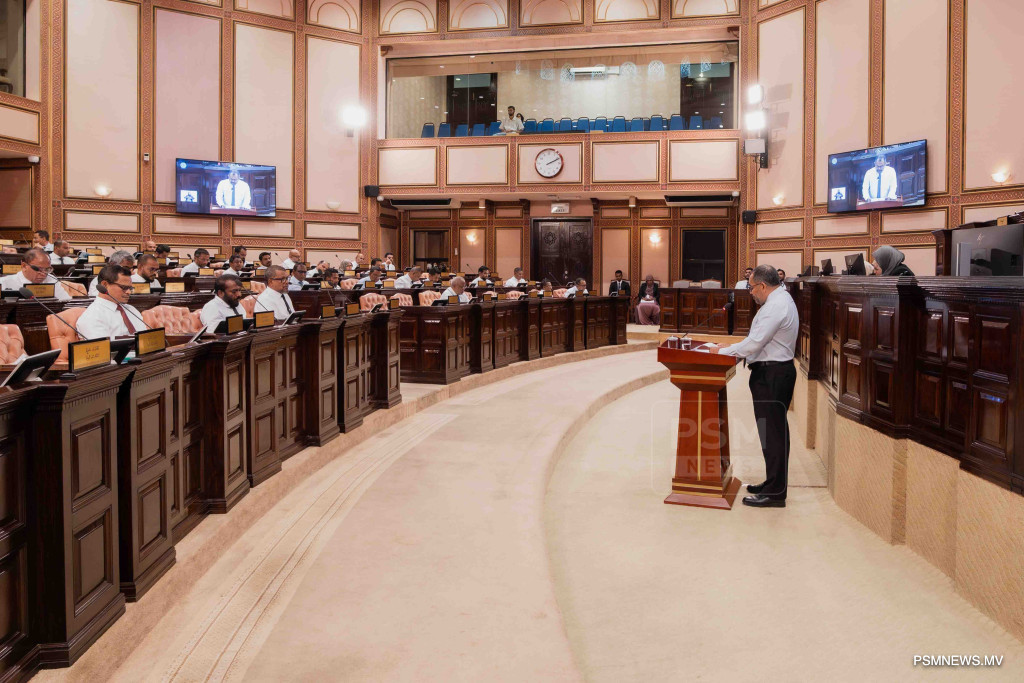Maldives Unveils USD 4.2 Billion Budget for 2026, Prioritising Fiscal Sustainability, Debt Reduction

The Minister of Finance and Planning, Moosa Zameer on Thursday presented the government’s comprehensive budget for the 2026 fiscal year to the Parliament, setting the total allocation at over USD 4 billion.
The proposed budget, officially tagged at USD 4.2 billion was immediately framed by Minister Zameer as a crucial instrument for immediate debt management and long-term fiscal resilience.
The proposed budget outlines a total estimated expenditure of USD 3.2 billion, which includes a substantial USD 2.6 billion dedicated to recurrent costs and USD 603.1 million allocated for new capital projects.
Minister Zameer specified that the government expects to collect USD 2.6 billion through total revenue and grants next year.
A key feature distinguishing the 2026 proposal is the aggressive inclusion of funds for existing liabilities. A relatively large amount—USD 603.1 million—has been specifically included for the repayment of existing securities and bonds due next year. After deducting this essential debt servicing expenditure, the effective operational budget for the coming year stands at USD 3.6 billion.
Addressing the Parliament, Minister Zameer stressed that the budget contains several measures to restore fiscal and debt sustainability. He characterised the proposal as laying the foundation for the President's development vision, aiming to tackle the huge debts inherited by this government and not burden future generations under prudent policies. He added that the budget is designed to deliver important national development goals and sustainable solutions for vital basic services such as health, education, and energy.
Concluding his statement, Minister Zameer formally requested Parliament to pass the budget as proposed, expressing gratitude for the Parliament's patience and determination in tackling the country’s economic challenges.

Minister Zameer, during his address, gave assurances that the government is poised to meet the substantial USD 600 million debt obligation next year, crediting sweeping economic reforms for the robust financial standing.
He emphasised the administration’s success in reshaping the economy to ensure timely fulfillment of all fiscal responsibilities.
The Minister highlighted significant improvements in the state’s financial health, noting that the government has maintained a budget surplus for the first 40 weeks of the current year.
As of September, official reserves stood at USD 860 million, with net usable reserves estimated at USD 200 million. Minister Zameer stated that this turnaround represents a full recovery from the fragile economic situation that existed when the administration took office, restoring confidence in its ability to timely manage external debt obligations.
To meet the critical debt obligation next year, the government, according to the Minister, has detailed a multi-pronged financing strategy. The plan aims to raise an overall USD 1.1 billion via a combination of external loans, the sale of government securities, and multilateral and bilateral financing.
Key components of this strategy include securing USD 450 million from external sources specifically for government securities’ refinancing. Additionally, the president’s official visits to friendly nations are projected to yield USD 300 million in budget support, while domestically, financial institutions are expected to raise around USD 324.3 million towards this effort.
Minister Zameer also provided an update on fiscal stabilisation measures, including the Sovereign Development Fund (SDF). The fund has been successfully put on track and converted into a dollar-managed mechanism for debt repayment, currently holding over USD 100 million in cash reserves.
The Minister confirmed that a portion of the projected domestic financing will be deposited into the SDF to further bolster the nation’s capacity to repay foreign debt.
